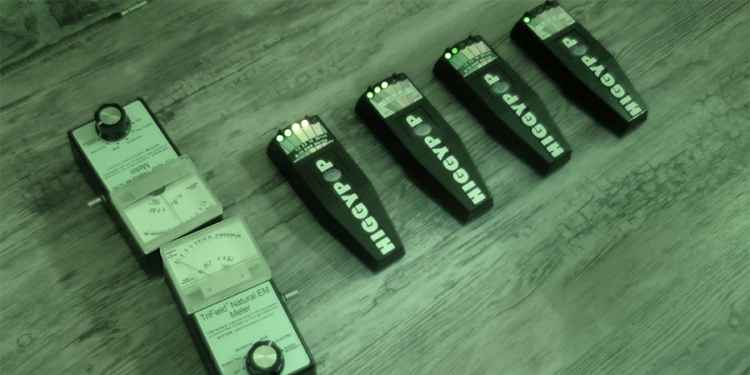What Makes An EMF Detector Go Off

The most commonly used of these electromagnetic field meters is the K-II. If you’ve ever used one and seen the pocket-sized devices lights suddenly blink on at green before shooting up to red, then you might have wondered exactly what is triggering the device.
Of course the belief within the paranormal community is that the device triggering indicates some kind of spiritual presence or supernatural energy, but the use of these devices always comes with the disclaimer that other things can affect it and trigger it.
Of course the most obvious thing that can set an an EMF meter off is something we all have in our pockets – a mobile phone, which is why it’s a good idea to put it in to flight mode during a paranormal investigations. However, you should be aware that some phones will still emit an electromagnetic field even when in flight mode, for features like NFC (near-field connectivity).
If you wear a smart watch, you should also remember that when you switch your phone to flight mode Bluetooth will be deactivated and your watch will be disconnected from your phone, but your watch won’t understand why and its Bluetooth will still be active and trying to re-connect to your phone. So be sure to set your smart watch to flight mode too, or just turn it off.
The thing many people don’t realise about K-II meters is that they’re not really supposed to pick up the signal from mobile phones. If you think about it, when you pick up your phone and make a call, your phone is communicating with a phone mast that could be miles away. So there are very few locations where you could be on a ghost hunt and the air not be full of mobile phone signals. In most cases the K-II simply ignores these frequencies, they’re outside of the devices detection range.
The reason why K-IIs do sometimes flash as a result of a mobile phone, is when it is close to the K-II. The meters are quite cheap, poorly made and not primarily designed for ghost hunting.
One of the problems with them is that they don’t have very good shielding from radio interference. The unshielded wires and components within the device act as antennas and when in very strong fields can cause a false reading. This is exactly what happens when a phone is close to a K-II meter, it overwhelms it and causes it to light up.
It is actually quite easy to tell if the K-II meter is picking up on an electromagnetic field within its detection range – the type of field many associate with the paranormal, or if it is being effected by manmade radio interference. If the lights are solidly lit then you know you are detecting an electromagnetic field. However, if the lights pulse or flash then this is interference being seen as a false positive.
In the examples above you can see the difference. On the left is what happens when you place a K-II meter near an electromagnetic field within its detection range. On the right is a K-II placed next to a mobile phone that is transmitting.
I was recently at an allegedly haunted location where I had the perfect opportunity to test what was causing what appeared to be false positive readings on a K-II meter.
We actually had four K-IIs laid out on the floor of an old industrial building in the South East of England. The devices started triggering, seemingly in a responsive manner, but it looked like it could have been being caused by a mobile phone or something similar because of the way the lights were pulsing.
We happened to have two TriField meters with us. These are a lot more costly than a K-II meter, but are much more sensitive and give a much better indication of what it’s picking up on than a K-II. Not only does it detect a wider band of the EM field, but it can also tell you exactly what type of electromagnetic field you’ve encountered.
The reason for using two was to cover all bases. We set one to ‘electric’, which means it detects very small changes to the ambient electric field – this is roughly the same sort of energy that the K-II meter should pick up if it is present. The other TriField meter was set to ‘radio/microwave detection’, this mode allows the device to detect mobile phones and other transmitting devices, the type of things that interfere with the K-IIs and give a false positive.
It didn’t take long for the K-IIs to flash again, and when they did I kept an eye on the needles of the TriField meters. The TriField that was set to ‘electric’ didn’t register any change, while the device set to ‘radio/microwave’ detection did show a fluctuation.
This told us that the K-II was almost certainly lighting up due to some kind of manmade transmission, but because the energy was coming in short bursts it wasn’t possible to pinpoint its source. So, although we know what type of energy was making the K-II to spike, the cause of that energy remains unexplained, but mostly likely came from the phone of someone else at the investigation who hadn’t set it to flight mode, of some kind of transmission equipment nearby – possibly a taxi firm’s office or microwave transmitter of some kind.
Although inconclusive, it was good to confirm using the TriField that pulsing lights on the K-II are caused by radio interference rather than electromagnetic fields.



